#emperor maximilian i
Explore tagged Tumblr posts
Text

Emperor Maximilian I
Artist: Albrecht Dürer (German, 1471-1528)
Date: (1459–1519) 1519
Medium: Oil on linden wood
Collection: Kunsthistorisches Museum Vienna, Austria
Emperor Maximilian I. (1459–1519)
The emperor is depicted here as an elegant private gentleman. The desired effect of dignity and power is achieved by the manner in which the emperor fills the frame and the brilliant execution of the fur collar. Several different interpretation have been suggested for the pomegranate in the emperor’s hand: as a private proxy for the imperial orb; as a reference to the myth of Persephone and thus a reference to death; and as an allusion to the conquest of Granada by the Christian armies in 1492.
#portrait#king of the romans#emperor maximilian i#painting#fine art#oil on wood#holy roman emperor#house of habsburg#costume#hat#italian history#cape#fur collar#pomegranate#italian royalty#german painter#german culture#artwork#16th century painting#european art
15 notes
·
View notes
Text

Equestrian lithograph of Emperor Nicholas I and Empress Alexandra Feodorovna of Russia with members of their family.
#emperor nicholas i#empress alexandra feodorovna#grand duke mikhail pavlovich#grand duchess elena pavlovna the younger#emperor alexander ii#empress maria alexandrovna#maximilian 3rd duke of leuchtenberg#grand duchess maria nikolaevna the elder#romanov#russia#equestrian
27 notes
·
View notes
Text

Emperor Maximilian I on an Alpine Ibex hunt by Franz Krammer
#franz krammer#art#maximilian i#emperor#austria#austrian#alps#landscape#hunt#hunting#alpine ibex#steinbock#goat#europe#european#habsburg#holy roman emperor#holy roman empire#medieval#middle ages#history#house of habsburg#mountains#mountain
49 notes
·
View notes
Text
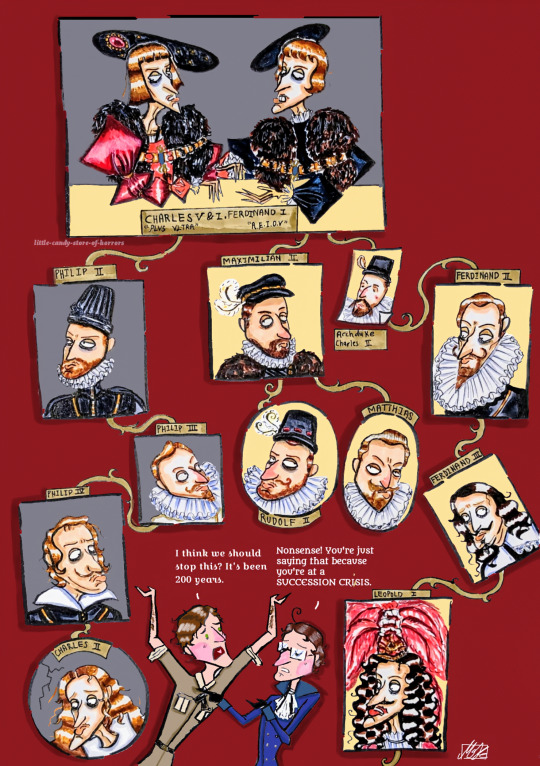
"Bella gerunt alii, tu felix Austria nube!"
Day 6 of @spaus-week 's challenge
"Let others wage war, you, happy Austria, marry!" Was the political strategy of the Habsburgs, and marry did the House of Austria! Infamously, scandalously, sensationally. A mangled wreath of a family tree. We all know this horror story. And we all know the bitter end.
((completed pedigree chart of Habsburg rulers from 1500-1918 here))
After Emperor Charles V&I divided his Spanish and Austrian inheritance ((also gained through his parents' and grandparents' marriages)) to his descendants and those of his younger brother Ferdinand I respectively, the Habsburg dynasty split into two branches. The Spanish and Austrian Habsburgs notoriously intermarried for generations, right up till Charles II of Spain whose heirless death in 1700 sparked the War of the Spanish Succession. The inbreeding and this informal Latin motto behind it has been blamed to hell and back for their implosion, for the physical ugliness that ran in this royal bloodline. But it is not to say the Habsburgs never went to war, nor that dynastic marriage was a political strategy unique to them! But they were, if anything, bloody successful at it seeing how they did rule half of Europe for 200 years, and then a lot of it in the Austrian line for another 200. Before anyone figured out inbreeding was bad it was considered a privilege to marry into the Habsburgs, with Louis XV claiming that Louis XVI's betrothal to Marie Antoinette was marrying the "Daughter of the Caesars", and Napoleon Bonaparte infamously ditching Josephine for Marie Louise. Charles II was a poor sod who took the fall and the mugs were wretched from the same ugly gene being passed around countless times*, but they did wear power and privilege well.
💅✨ Symbolism bc I'm a NERD and this my Category 10 autism event ✨💅 :
Charles V & Ferdinand I's joint portrait based on that propaganda woodcut, behind them the colours of the Habsburg flag.
The Spanish branch, comprising Charles V & I's descendants, is represented with a black background, and the Austrian branch, comprising Ferdinand I's descendants, gold, both colours pulled from their flag, a dynasty intertwined but split in two.
Round frames denote that the individual had no heirs.
Only the most influential ruler on both sides, the King of Spain and the Holy Roman Emperor, are represented as framed portraits, explaining Archduke Charles II's unframed depiction.
The unconventional placement of Charles II of Spain and Emperor Rudolf II's nameplates are a nod to their queerness: their intersexuality and bisexuality respectively.
Ferdinand III's portrait is lopsided because of the losses of the 30 Years War.
Cracks in Charles II's portrait: 🙃🙃🙃
#Was this just an excuse for me to draw the family tree/wreath? YES. Might continue it to Blessed Karl™ *faints*.#That said i literally took three tries to get the Austrian branch right in just this fraction. Nightmare.#spausweek#Charles v#philip ii#philip ii of spain#Philip iii#philip iv of spain#felipe iv#charles ii of spain#Carlos ii#ferdinand i#Maximilian ii#rudolf ii#Emperor Matthias#Ferdinand ii#Ferdinand iii#Leopold i#16th century#17th century#habsburg history#house of habsburg#austrian history#spanish history#historical hetalia#aph austria#aph spain#roderich edelstein#Antonio Fernandez#Hetalia
72 notes
·
View notes
Text
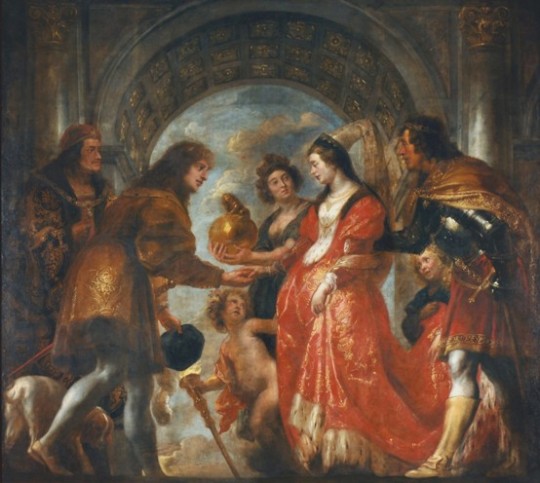
The Wedding of Mary of Burgundy with Maximilian of Austria by Jacob Jordaens, between 1634 and 1635
#maximilian i#mary of burgundy#new post#historical fashion#art#history#artwork#fashion history#oil painting#painting#historical#oil on canvas#jacob jordaens#1630s#duchy of burgundy#holy roman emperor#holy roman empire
29 notes
·
View notes
Text
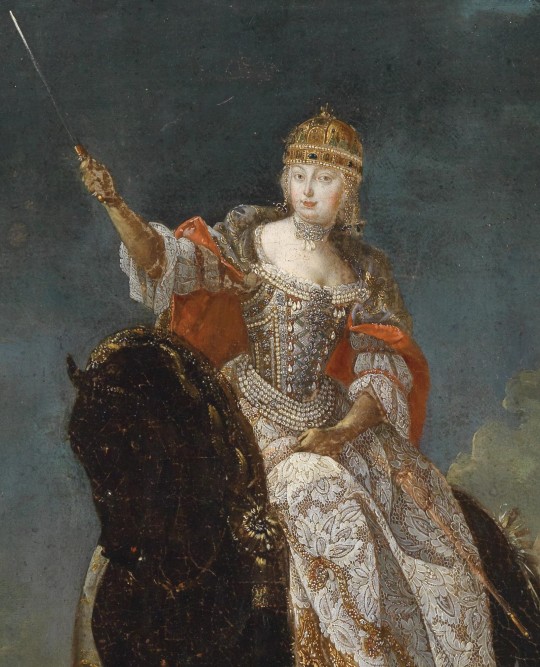

Maria Theresa, Archduchess of Austria, Queen of Hungary, Croatia and Bohemia, etc. reigned 1740-1780
Gaslight, gatekeep, girlboss
From anon: - chucked into ruling at age 23. while pregnant - no prep!!!! Prussia invades Silesia!!! Ministers fucking around for their own provincial interests instead of for the Whole !!!!! and she has to somehow cope with all of this .... - ALL WHILE being pregnant with Joseph (II) and we know that guy was just as ornery in utero as he was irl - she's everything! He (Francis) is just ....Ken. - YAS QUEEN rediversify that gene pool - originally reluctant to participate in the 1st partition of poland (who wants galicia let's be real)
Maximilian I, Holy Roman Emperor, reigned 1508-1519
Established marriage as politics
38 notes
·
View notes
Text
Hello! My name is Arisu.❤ I love history and historical figures. Also I love " The emperor's new groove" and " The emperor's new school ". Kuzco is my favorite character. ✨💅 I will write stories and facts about my favorite historical figures, sometimes I will post fanarts.👑
My muse @greatgaiuscaesar
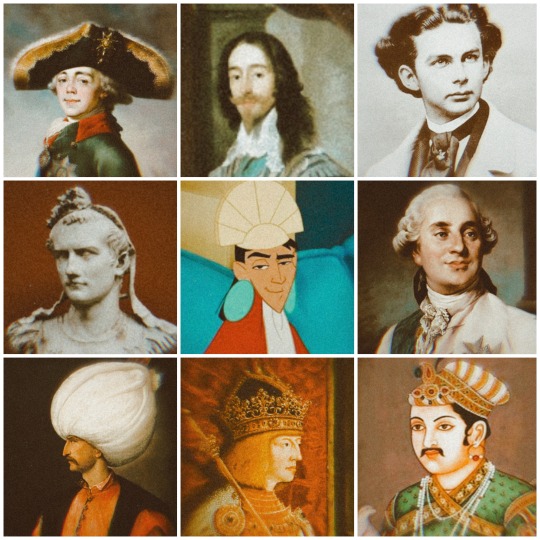
My favorite cartoons:
The emperor's new groove
The emperor's new school
All hail king Julien
My favorite dynasties:
Romanov ( Russia )
Bourbon ( France )
Julio - Claudian ( Roman Empire)
Habsburg ( Holy Roman Empire )
Wittelsbach ( Bavaria )
Stuart ( Britain )
Ottoman ( Ottoman Empire)
Mughal ( India)
Chingizid ( Mongol Empire )
Mauryan ( India )
Hohenzollern ( Prussia )
Draculesti ( Romania )
Burgundian ( Castile and Leon )
Wessex ( England )
Hanoverian ( Britain )
Abbasid ( Abbasid Chalifat )
Solomonic ( Ethiopia )
Luxembourg ( Czech )
Argead ( Macedonia )
Artashesid ( Armenia )
Comnenos ( Byzantine )
If you are interested in any of these topics, you can discuss it with me.😉
#emperor kuzco#emperor caligula#paul i of russia#louis xvi#Charles I Stuart#ludwig ii#Maximilian I Habsburg#suleiman the magnificent#Akbar the great#hello tumblr
12 notes
·
View notes
Text

These gloves, which stand stately as if they came out of the hands of Nazgül from the Lord of the Rings, are from Holy Roman Emperor Habsburg, Maximilian I (22 March 1459 – 12 January 1519).
It's one of the first examples of the century Gothic style.
These gloves, which were handed over to the emperors after them, were in the heritage of the Habsburg Dynasty.
📍: Museum of Military History in Vienna, Austria
#Maximilian I#Holy Roman Emperor Habsburg#Habsburg Dynasty#gloves#gothic style#Nazgul#Lord of the Rings#Arsenal Museum#Austria
17 notes
·
View notes
Text
Can we have a limited series about Margaret of Austria? She’s so interesting! Betrothed to the King of France, she was dumped by him in favor of her would-be stepmother. Then she was engaged to the Prince of Asturias, but he died, and afterward, she married the Duke of Savoy, who passed away three years later. After that, she became regent and governor of the Low Countries for her nephew, raising him and her nieces.
Get my girl her moment!
#margaret of austria#house of habsburg#maximilian i#holy roman empire#holy roman emperor#charles v#habsburg#habsburg dynasty#austria#low countries
5 notes
·
View notes
Text
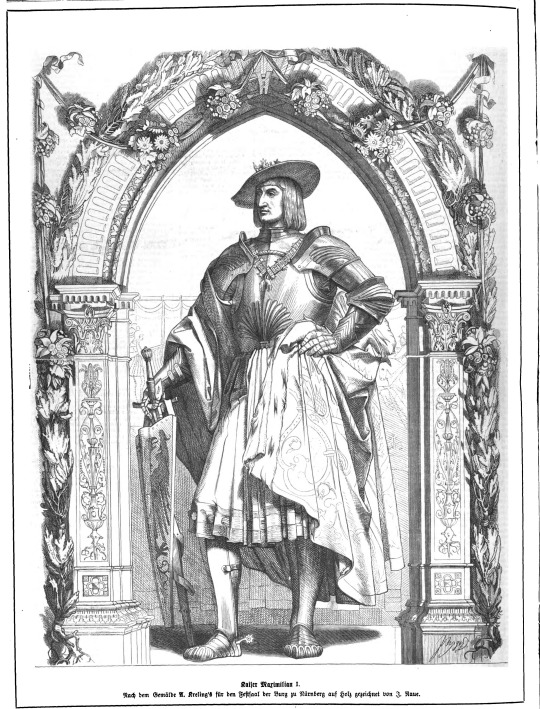
Emperor Maximilian I of Austria. By Julius Naue and August von Kreling.
#heiliges römisches reich#full length portrait#maximilian i#haus habsburg#erzherzogtum österreich#house of habsburg#holy roman empire#holy roman emperor#julius naue#august von kreling#royalty
5 notes
·
View notes
Text
Margaret of Austria is Shipwrecked and King Henry VII of England Writes to Her at Southampton – 1497
Probably by Pieter van Coninxloo Diptych: Philip the Handsome and Margaret of Austria about 1493-5 https://www.nationalgallery.org.uk/paintings/GROUP20 When King Charles VIII of France put into motion his plans to extend his power basis into Italy, he attacked Naples which belonged to the sphere of influence of King Ferdinand of Aragon. Holy Roman Emperor Maximilian I concluded an anti-French…
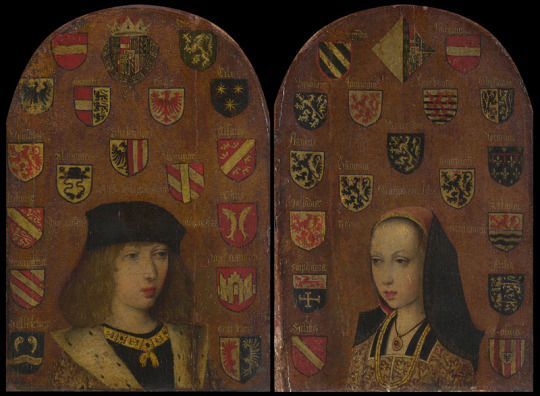
View On WordPress
#Burgundian history#Charles V#Duke of Burgundy#Ferdinand#Henry VII#Holy Roman Emperor#Isabella#Juan Prince of Asturias#Juana of Castile#King of Aragon#King of England#Margaret of Austria#Maximilian I#medieval history#Philip the Handsome#Queen of Castile#Spanish history#Women’s history
14 notes
·
View notes
Text

Emperor Maximilian I Enters Ghent
Artist: Anton Petter (Austrian, 1781-1858)
Date: 1822
Maximilian I, Holy Roman Emperor
Maximilian I (22 March 1459 – 12 January 1519) was King of the Romans from 1486 and Holy Roman Emperor from 1508 until his death in 1519. He was never crowned by the Pope, as the journey to Rome was blocked by the Venetians. He proclaimed himself elected emperor in 1508 (Pope Julius II later recognized this) at Trent, thus breaking the long tradition of requiring a papal coronation for the adoption of the Imperial title. Maximilian was the only surviving son of Frederick III, Holy Roman Emperor, and Eleanor of Portugal. Since his coronation as King of the Romans in 1486, he ran a double government, or Doppelregierung (with a separate court), with his father until Frederick's death in 1493.
#landscape#crowd#horse#king#emperor maximilian i#roman emperor#roman monarch#roman royalty#houses#road#ghent#romans#anton petter#austrian painter#16th century rome#19th century art
1 note
·
View note
Text
Me visiting a historical landmark that was home to a historical figure: wow I need this guy to be an angsty dumb teenager in clone high now
3 notes
·
View notes
Text

Combination Sallet and Bevor of Maximilian I by Lorenz Helmschmid, circa 1495. Kunsthistorisches Museum, Vienna, Imperial Armoury
#maximilian i#helmet#armour#medieval#middle ages#habsburg#art#history#europe#european#holy roman emperor#holy roman empire#knights#knight#emperor#lorenz helmschmid#austria#germany#sallet#bevor#augsburg#vienna#german#austrian#habsburg empire#helmets
440 notes
·
View notes
Photo
The Tournament Book, dating back to the mid-16th century, is a captivating manuscript that immerses readers in the vibrant world of medieval jousting and pageantry. At its core, this manuscript delves into the central theme of medieval jousting, an immensely popular form of knightly competition that reigned supreme during its era. Jousting, a sport of armored knights engaging in combat on horseback with long lances, provided a rigorous test of their martial skills, all the while serving as a stage for the exhibition of their chivalry and honor.
The Tournament Book extends beyond the jousting arena to explore the grand tapestry of medieval pageantry that accompanied these tournaments. This pageantry encompassed a diverse array of activities, ranging from majestic processions to sumptuous feasts, from enchanting masquerades to harmonious music. All these elements were meticulously orchestrated to entertain and awe spectators, creating a truly immersive experience. The splendor of these festivities saw a notable upsurge during the reign of the Holy Roman Emperor Maximilian I (1493-1519) and his successors. Under Maximilian's patronage, tournaments reached new heights, with the emperor pioneering fresh forms of competition to elevate the grandeur of these events.
In today's renditions of jousting tournaments, there is a conscious effort to capture the essence of medieval pageantry, although there are nuanced differences in the procedures and the scale of these events. Modern considerations of historical accuracy and safety often influence the way contemporary tournaments are organized. Nevertheless, the Tournament Book stands as a captivating window into the splendid pageantry and enduring chivalric traditions of the medieval era, revealing not only the physical tests but also the profound cultural and societal significance of these captivating events.




Horse armor styles from 1560–70 as painted in this German Tournament Book.
#history#military history#art#medieval art#equestrianism#jousting#animals#holy roman empire#maximilian i holy roman emperor#horses
741 notes
·
View notes
Text
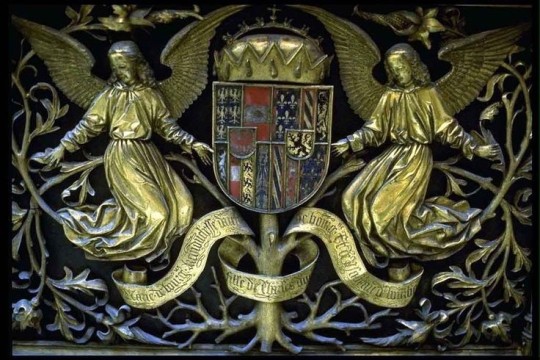
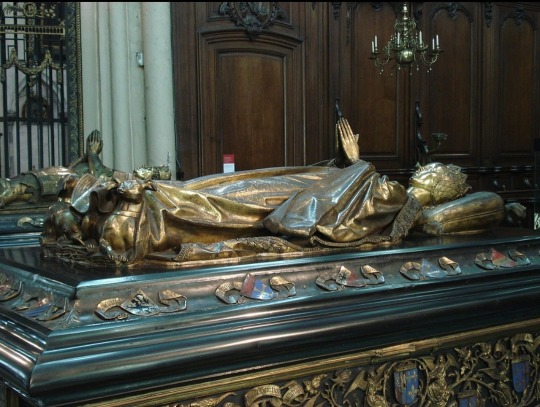
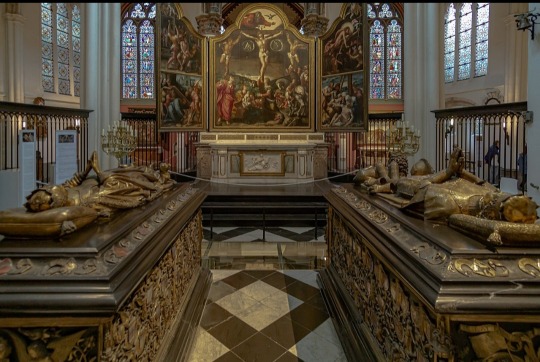
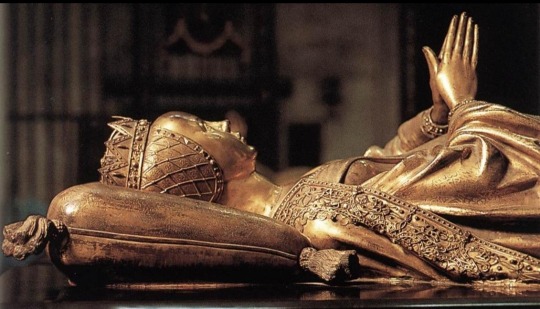

The Tomb of Mary of Burgundy in the Church of Our Lady, Bruges, 1501
#mary of burgundy#new post#historical#bruges#burgundy#medieval#historical fashion#history#medieval fashion#effigy#duchy of burgundy#coats of arms#bronze#gilt#Tomb effigy#house of habsburg#House of Valois-Burgundy#House of Valois#Maximilian I#Holy Roman Emperor#Philip the Handsome#1500s#1480s#gothic art#International Gothic#renaissance#Northern Renaissance#renaissance fashion
18 notes
·
View notes